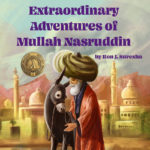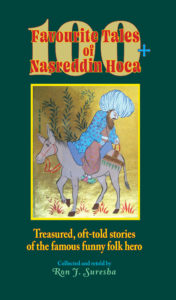Nasruddin was leading his donkey down the street just outside the narrow streets of the bazaar, counting his coins, when a con artist saw him coming and called out to him.
“Young sir! Pardon me!” he said as he walked up to Nasruddin. “You seem like a handsome fellow of exceptional insight and most discriminating tastes!”
Nasruddin was charmed. “Why, thank you, effendi. How did you know?”
“I saw you approaching and I can tell that you are a bright young man who is sharp enough to recognize that he needs something I have right here.”
“Oooh,” said Nasruddin, intrigued. “what could it be?”
“This magic nosebag,” the man said as he produced out of thin air a nosebag. “Magic nosebag, magic nosebag, give me a rabbit.” Then he proceeded to pull out of the nosebag a rabbit. He repeated the magic manifestations with a ball, and then a potted plant.
Nasruddin couldn’t part with his money fast enough. He took the magic nosebag and peered inside: it looked deep but empty.
“Just one thing,” the salesman said, “before I leave you to discover the delights of your magic nosebag. Please — don’t annoy it. These things are quite temperamental, as you can well understand, and very shy. Don’t confide in too many people about its special nature. All will be well.”
Nasruddin thanked him profusely and with the magic nosebag returned to Akşehir. Instead of proceeding directly to the teahouse as he would do normally, he went straight home. By now he was quite thirsty, so he sat down, placed the bag on the table in front of him. “Magic bag, magic bag,” he incanted, “give me a cup of water.”
He put his hand inside the bag — but it was empty.
At first Nasruddin was very angry. But then he thought, It’s temperamental, and so it gives out only rabbits, balls, and potted plants.
“Alrighty then, let’s try this: Magic bag, magic bag, give me a rabbit instead.”
No rabbit manifested.
Nasruddin thought it should have been of no offense to ask.
“Please don’t get annoyed with me. I just don’t understand the ways of magic nosebags.”
He thought, When my donkey is temperamental, I buy it a nosebag. So maybe the opposite is true. So he rode back to town and bought a new donkey for the nosebag.
As Nasruddin returned home, his friend Abdul greeted him and asked why he was leading two donkeys.
“An understandable misconception, effendi,” said Nasruddin. “What you are seeing here is not two donkeys. This is actually one donkey and her nosebag, and one nosebag with its donkey.”



How to Catch Up
The story of the Mullah using ammonia to make his donkey, and then himself, move, is told conjoined often with the previous one, “Got Up and Went.” Dozens of the most popular Nasruddin jokes and stories are donkey tales, including the ones included in this blog’s “donkey tales” category.
These charming and poignant stories of a master and his donkey — or is it a donkey and his master? — closely identify our hero Nasruddin with his obedient four-legged companion. It’s sometimes challenging to differentiate between the Mullah and beloved his little gray donkey.
But the donkey is not just the Mullah’s comedic or literary vehicle. The donkey is portrayed as beast of burden that symbolizes both obedient labor and its opposite, obstinate inertia.